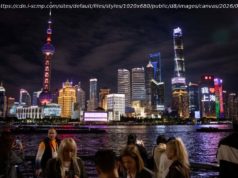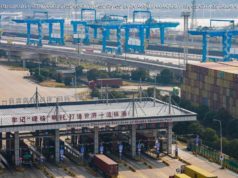The Chinese president has cemented his position as the most dominant leader since Mao Zedong.
China’s Communist Party meets every five years to outline, among other things, its goals for the next half decade, lay out its plans for political succession, and state its economic goals. The idea is to maintain stability through continuity while advancing the kinds of programs that have transformed China into the world’s second-largest economy. This year, though, the party congress, which just concluded, had some significant new elements. It enshrined the “thought” of Chinese President Xi Jinping into the party’s constitution, an honor previously accorded only Mao Zedong; second, it did not reveal a successor to Xi, who under the current rules must step down in 2022; third, it did not outline a plan for the kind of double-digit economic growth that China has enjoyed over the past two decades. The political consequences, at least in the medium term, will be a consolidation of Xi’s power, experts said, while the economic consequences could have far-reaching global effects.
Three seemingly innocuous words—“Xi Jinping thought”—and their inclusion in the Communist Party’s constitution “greatly increases, … broadens, and deepens Xi Jinping’s personal power within the Chinese system,” Abraham Denmark, director of the Asia program at the Wilson Center, told me.
“Xi Jinping thought” has 14 main principles, including a reform of the rule of law; the need to follow socialism with Chinese characteristics; environmental conservation, as China moves to increase the share of its energy produced by renewable sources; and giving the Communist Party “absolute authority” over the military. Xi’s “thought” will now be taught in Chinese schools and propagated in the state-run media, which all but ensures that the Chinese president’s ideology will remain both politically and culturally significant for years, if not decades, to come. Xi now “has a greater ability to drive policy across the entire apparatus of the Chinese state—the government, as well as the party, and the military. … And it also puts more pressure on those who would oppose him to get in line and support his initiatives,” Denmark said.
What it also does, said Christopher K. Johnson, a senior adviser at the Center for Strategic and International Studies in Washington, is cement Xi’s position as one of China’s three great modern leaders.
“He’s taking Deng Xiaoping’s formulation of socialism with Chinese characteristics, but adapting it to his own perception—that there’s this new era— and that helps him … erase his two immediate predecessors, Jiang Zemin and Hu Jintao, from political history,” Johnson told me. “Because he’s effectively saying there are three eras in modern Chinese history: the Mao era, the Deng era, and now the Xi Jinping era.”
One function of the party congress is to appoint new members to the Politburo Standing Committee, the top decision-making body in the Communist Party and hence in the country as a whole, with Xi at the helm. Among the six members in addition to Xi, one factor stood out—their age. The fact that all were in their 60s and likely to retire when their term concludes at the next party congress appeared to signal that Xi had broken with tradition and declined to designate a successor—perhaps signaling that he intends to stay on as the Chinese leader after his second five-year term ends in 2022. (By tradition, Chinese leaders since Deng have stepped down after 10 years.) But Tristan Kenderdine, research director at Future Risk, and an expert of Chinese trade, industrial, and agricultural policy, said in an email that one can’t infer too much about Xi’s plans from the committee’s composition. “We always over-speculate these things because we simply do not know,” Kenderdine said, adding: “Five years is a long time in Chinese politics.”
Still, Kenderdine and others I spoke to said the Xi Jinping era may last well beyond 2022—and not just because of the constitutional change and the lack of a clear successor. It also helps that he’s immensely popular with the Chinese people, who tend to view him as both strong and a defender of China’s interests globally; that the anti-corruption drive he’s conducting has broad public support, even if it’s unpopular with the Communist Party’s senior leadership; and that his achievements over the past five years have eclipsed those of his predecessors. Denmark pointed to Deng’s continuing influence on Chinese politics long after he left office in 1989, and said that Xi might be similarly influential in the years to come. The Chinese leader is 64 years old, still young enough to have leverage after he is currently scheduled to retire at age 69.
“Whether Xi Jinping remains formally in power after 2022 remains to be seen,” Denmark said, “but even if he were to formally leave, I would expect he would continue to hold a great deal influence and sway over Chinese politics for a long time to come.” Kenderdine added a word of caution: Xi “could well stay on behind the scenes for longer as Deng did”—despite his formal retirement, Deng retained de facto power for several years until his health failed —“ but a lot depends on the strength of his political allies in this five-year term, so let’s see how he reacts as his runs with his own horses this term.”
Two other significant announcements to come from the party congress concerned China’s foreign policy and its economy. The country’s massive international infrastructure initiative, known as Belt and Road, was given formal status in the constitution, even while the congress seemed to de-emphasize what the world has come to expect from the Chinese economy: aggressive growth.
Denmark said it’s fairly unusual to have a foreign-policy project like the Belt and Road initiative be formalized in the party’s constitution. “It suggests,” he said, “that they see this as a very long-term major effort by China for decades to come.” Although some of China’s neighbors have willingly embraced the initiative, whereby China has already spent some hundreds of billions in loans for infrastructure projects in its region and beyond, the U. S. has called it “predatory economics.” China expects in many cases to be paid back and can take over the projects it’s funded—say, ports in Pakistan or roads in Sri Lanka—if not compensated. But Belt and Road, along with the apparent effort of China’s state-run media to export the Chinese model of government, could be viewed as Beijing’s attempt to exert its influence in the developing world. Denmark called the state-run media’s English coverage of the congress “remarkably triumphalist” and a marked departure from the past. He added: “This really suggests that they see the new era of China under Xi Jinxing as a period in which China translates the prosperity it developed under Deng into real geopolitical power… in Asia—and certainly potentially around the world.






